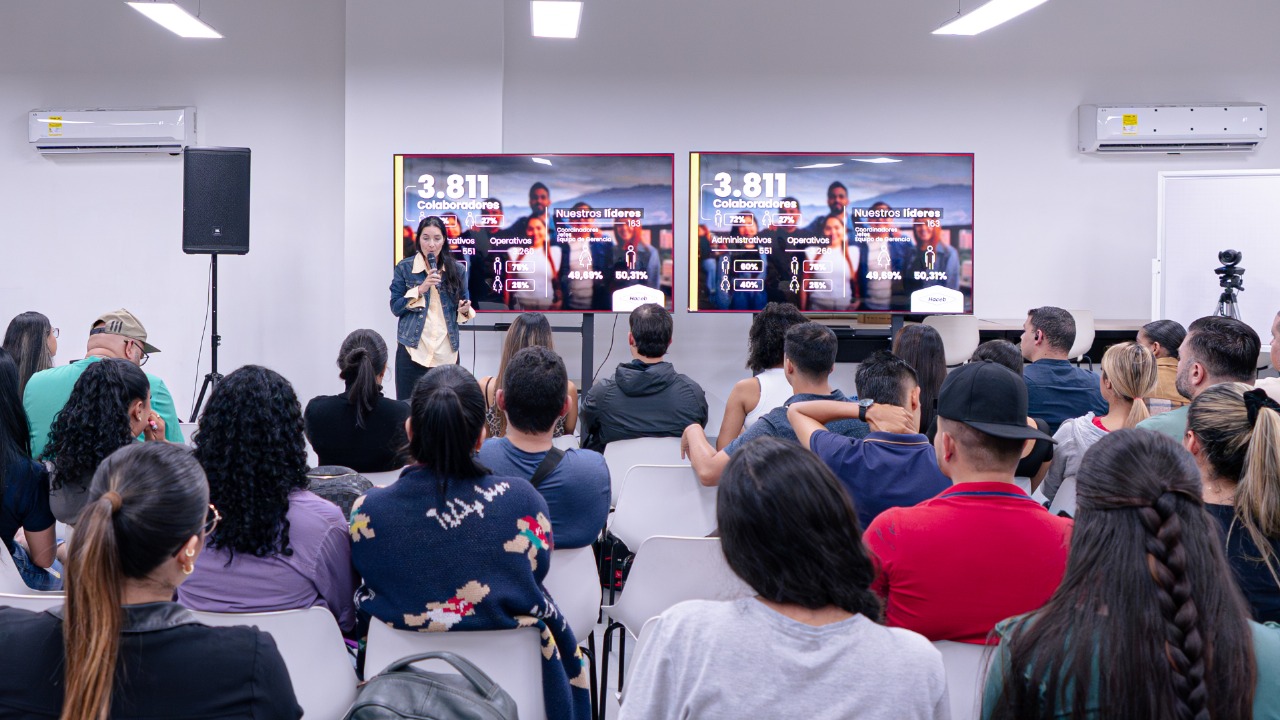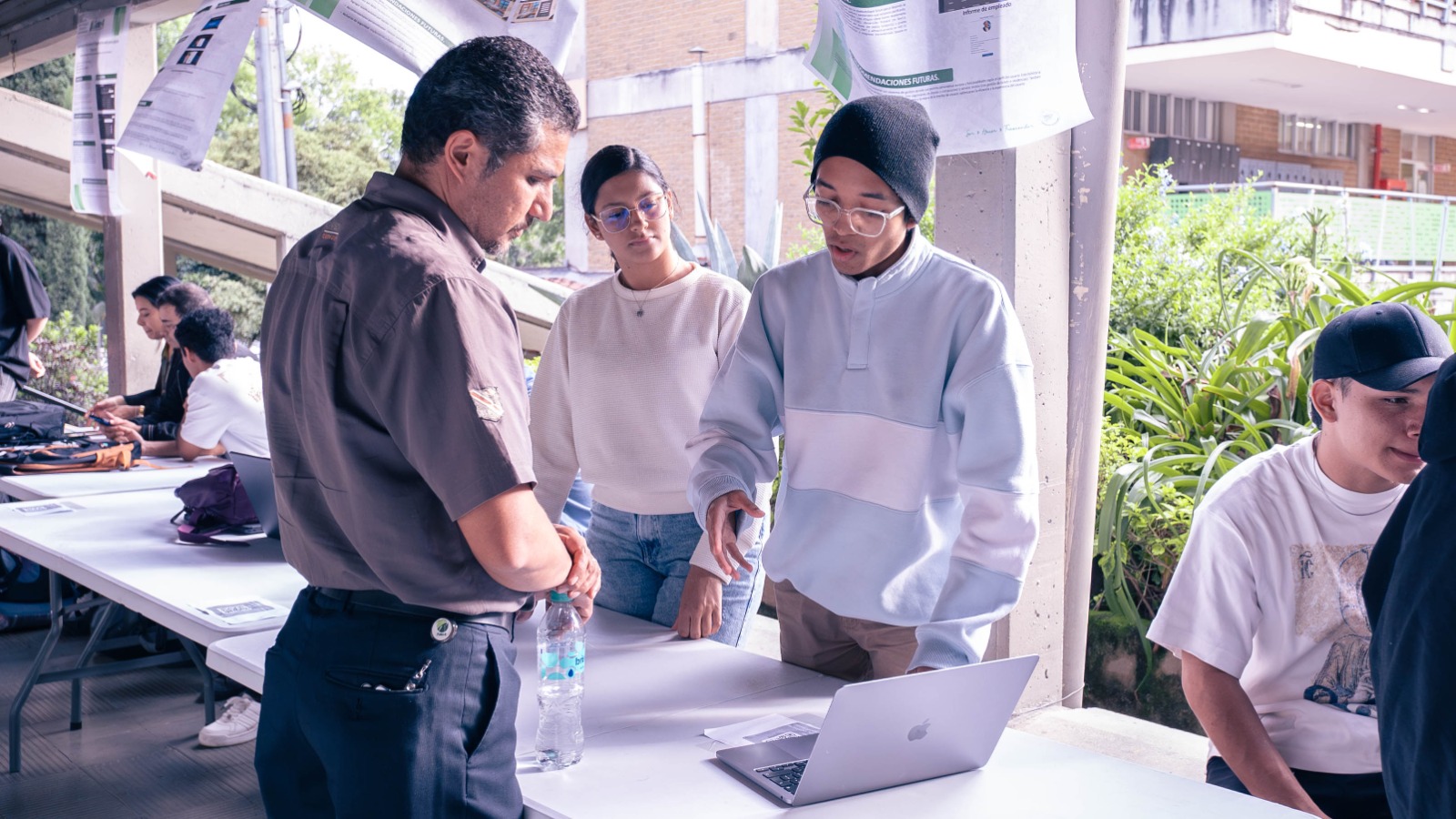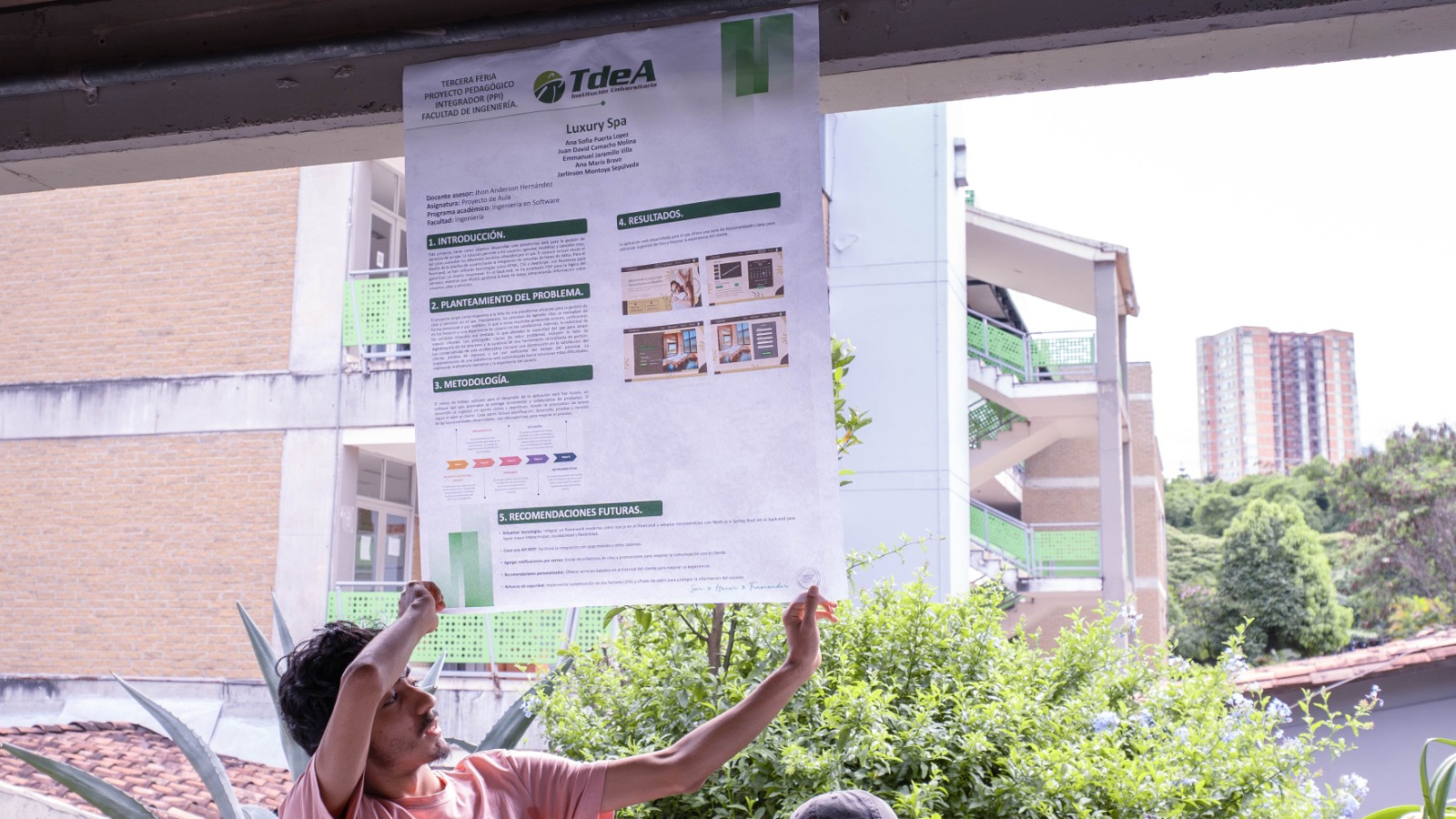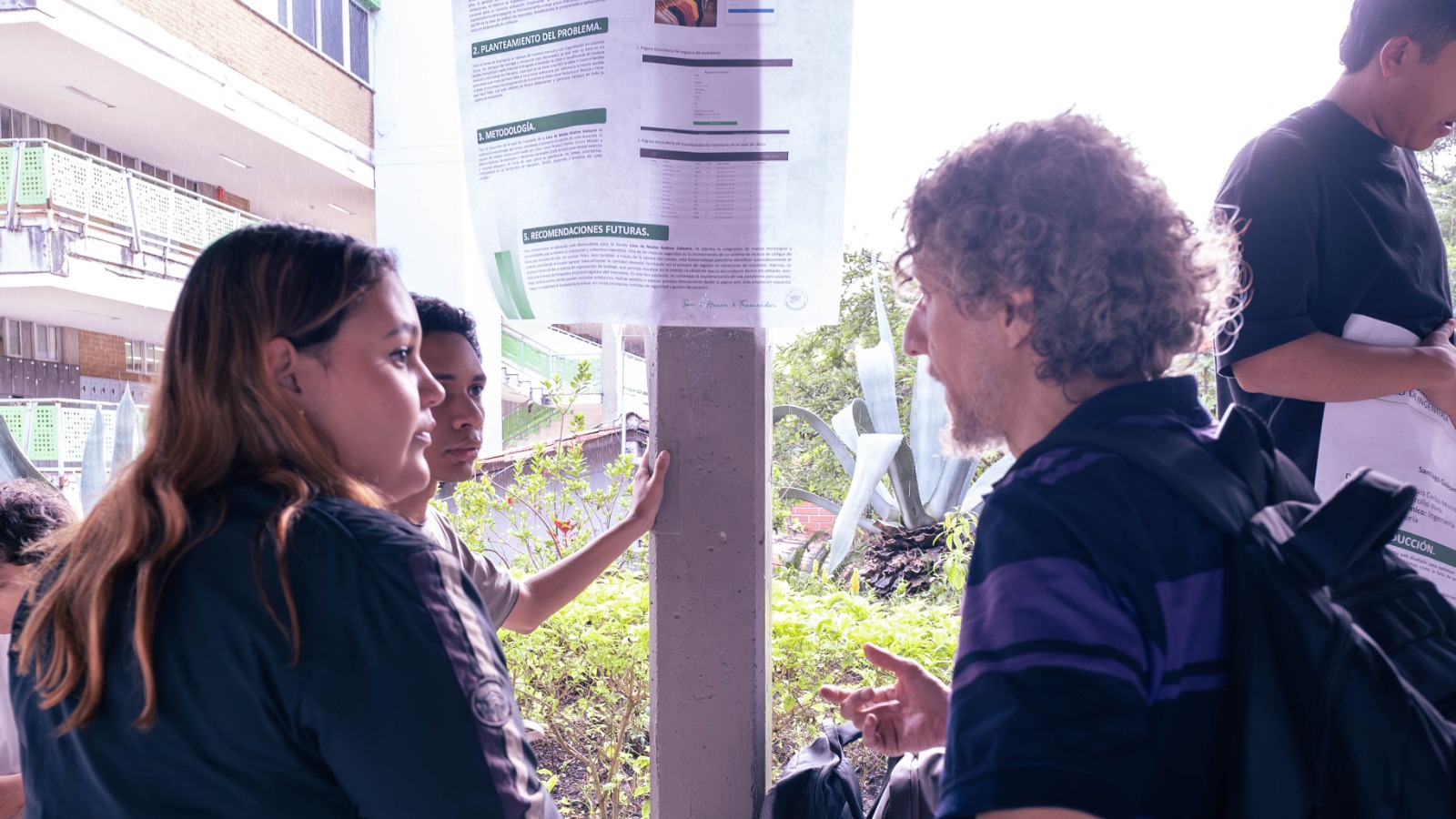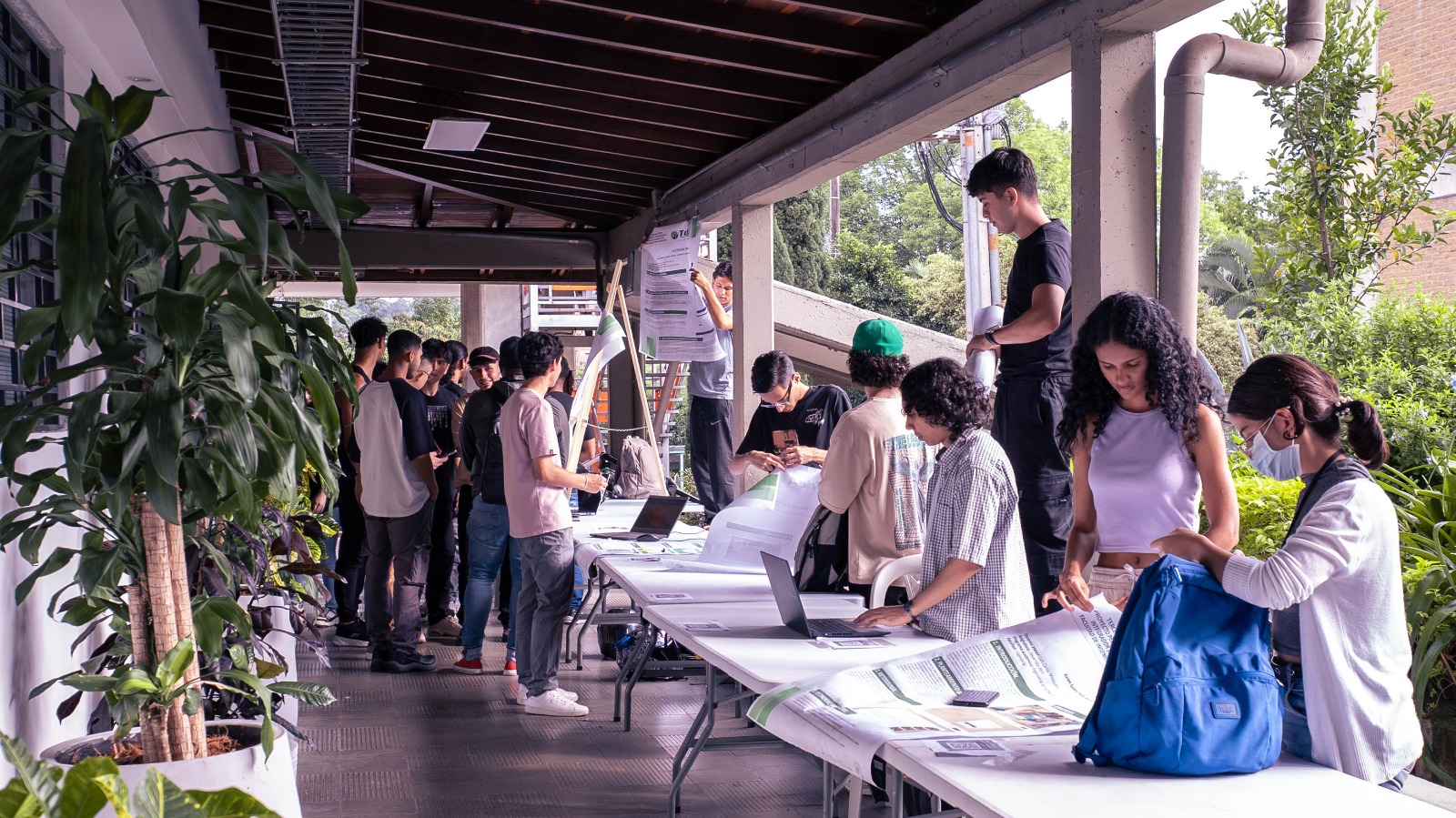Más de 150 estudiantes de la Facultad de Ingeniería del TdeA participaron en una nueva edición del Proyecto Pedagógico Integrador (PPI), una estrategia que promueve la investigación formativa desde los primeros semestres y culmina en la presentación de desarrollos de software con aplicación práctica.
Ha sido una herramienta clave para articular los conocimientos adquiridos en diferentes asignaturas, fomentar el trabajo en equipo y acercar a los estudiantes al mundo de la innovación. Bajo esta metodología, los estudiantes inician en primer semestre la formulación de un proyecto que evoluciona a lo largo de su carrera. En semestres intermedios, por ejemplo el tercero en el Técnico Profesional en Sistemas o el quinto en Ingeniería de Software, los proyectos llegan a su etapa de desarrollo y se socializan ante compañeros y docentes.
“Ha evolucionado desde 2007, de proyectos muy teóricos a proyectos donde ellos escogen una problemática, identifican requisitos, diseñan una arquitectura de software, hacen la construcción del código, hacen unas pruebas de software y luego presentan sus prototipos”, explicó el profesor Manuel Alexander Valbuena Henao, quien indicó que desde 2014 la exposición se realiza por Extensión y los chicos reciben un certificado como ponentes en evento investigativo. También agregó que, además de servir como evaluación de los resultados de aprendizaje, la jornada permite tener evidencia para los procesos de calidad institucional, seguimiento y planes de mejoramiento de programas.
Durante el evento, se presentaron 54 proyectos, algunos abordaron problemáticas cotidianas como la gestión de inventarios y el pago de impuestos, mientras que otros se enfocaron en necesidades sociales o educativas, como el aprendizaje de idiomas, matemáticas o la programación de citas médicas en hospitales.
Uno de los proyectos presentados fue el de Juan Camilo Arroyave, junto a sus compañeros Diover Farley Sánchez y Kevin Márquez, de quinto semestre de Ingeniería de Software. Su propuesta busca integrar en una sola plataforma todos los impuestos que deben pagar los ciudadanos del área metropolitana de Medellín. “Queremos que las personas reciban notificaciones oportunas sobre sus obligaciones, ya sea por WhatsApp o correo, y así evitar cobros por mora”, detalló Juan Camilo. El equipo espera que su idea pueda vincularse con instituciones oficiales y convertirse en una solución real.
Otro grupo, integrado por los estudiantes Santiago Galeano, Jorge Alvarado y Jeremy Santiago, desarrolló una plataforma para agendar citas médicas de manera ágil. “Desde segundo semestre venidos trabajando en el proyecto. Vimos que las páginas de algunos hospitales son poco funcionales y que la mayoría de citas se siguen haciendo por teléfono, y la verdad es espera tras espera, remiten a otra línea. Queremos ofrecer una opción más eficiente desde una aplicación web que integre todo”, contó Santiago.
El profesor Luis Carlos Mosquera, quien acompaña en el proyecto a los estudiantes en la asignatura de Construcción de Software 3, destacó el valor del PPI como ejercicio integrador: “Aquí confluyen aprendizajes de diferentes materias como bases de datos, lógica de programación y diseño, son muchas que convergen para la construcción de este proyecto”, añadió que esta muestra les permite recibir retroalimentación de otros estudiantes y visibilizar sus capacidades.
Aunque los proyectos nacen y se desarrollan como parte de la asignatura integradora de cada semestre, varios encuentran continuidad en los semilleros de investigación o incluso en iniciativas de emprendimiento en el CETI. Desde la Dirección de Investigaciones del TdeA se promueve esta cultura investigativa desde el primer semestre, reconociendo el papel de la investigación formativa como base para propuestas innovadoras y de impacto social.
El objetivo es que los estudiantes no solo aprendan a programar, sino que comprendan el valor de la tecnología como herramienta para resolver problemas reales. Este tipo de ejercicios los prepara para enfrentar el mundo laboral con ideas, criterios y experiencia práctica.
![]()
Engineering students showcase their research in the classroom
More than 150 students from the School of Engineering at TdeA participated in a new edition of the Integrative Pedagogical Project (IPP), a strategy that promotes formative research from the early semesters and culminates in the presentation of software developments with practical applications.
It has been a key tool for articulating the knowledge acquired in different subjects, fostering teamwork, and bringing students closer to the world of innovation. Under this methodology, students begin in their first semester the formulation of a project that evolves throughout their career. In intermediate semesters, for example, the third in the Professional Technician in Systems or the fifth in Software Engineering, the projects reach their development stage and are presented to peers and teachers.
"It has evolved since 2007, from very theoretical projects to projects where they choose a problem, identify requirements, design a software architecture, build the code, conduct software tests, and then present their prototypes," explained Professor Manuel Alexander Valbuena Henao, who indicated that since 2014 the exhibition has been organized by Extension and the students receive a certificate as speakers at a research event. He also added that, in addition to serving as an evaluation of learning outcomes, the event provides evidence for institutional quality processes, monitoring, and program improvement plans.
During the event, 54 projects were presented, some addressing everyday issues such as inventory management and tax payment, while others focused on social or educational needs, such as language learning, mathematics, or scheduling medical appointments in hospitals
One of the projects presented was by Juan Camilo Arroyave, along with his classmates Diover Farley Sánchez and Kevin Márquez, from the fifth semester of Software Engineering. Their proposal seeks to integrate all the taxes that citizens of the Medellín metropolitan area must pay into a single platform. "We want people to receive timely notifications about their obligations, whether through WhatsApp or email, and thus avoid late fees," Juan Camilo detailed. The team hopes that their idea can be linked with official institutions and become a real solution.
Another group, composed of students Santiago Galeano, Jorge Alvarado, and Jeremy Santiago, developed a platform for scheduling medical appointments efficiently. "Since the second semester, we have been working on the project." We saw that the websites of some hospitals are not very functional and that most appointments are still made by phone, and honestly, it's wait after wait, being referred to another line. "We want to offer a more efficient option through a web application that integrates everything," Santiago said.
Professor Luis Carlos Mosquera, who accompanies the students in the Software Construction 3 course, highlighted the value of the PPI as an integrative exercise: "Here, learnings from different subjects such as databases, programming logic, and design converge; many come together for the construction of this project." He added that this showcase allows them to receive feedback from other students and showcase their capabilities.
Although projects are born and developed as part of the integrative course of each semester, several find continuity in research groups or even in entrepreneurship initiatives at CETI. From the Research Directorate of TdeA, this research culture is promoted from the first semester, recognizing the role of formative research as the foundation for innovative proposals and social impact.
The goal is for students not only to learn programming but also to understand the value of technology as a tool for solving real problems. This type of exercise prepares them to face the job market with ideas, criteria, and practical experience.



